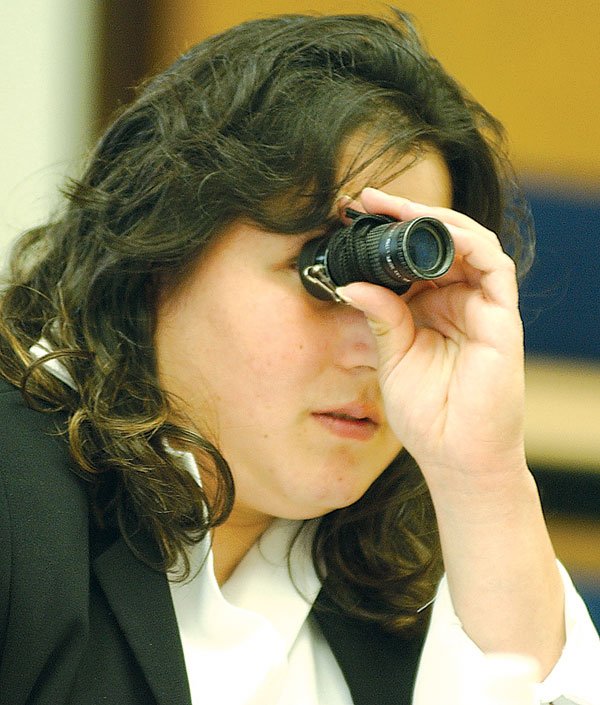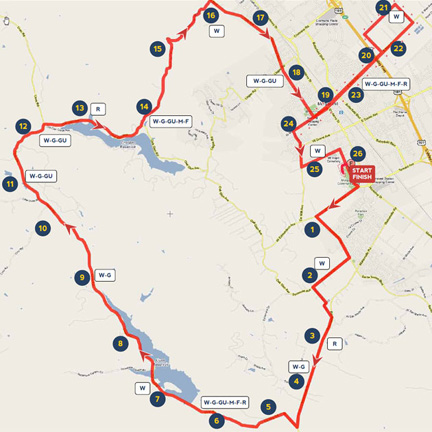By Melissa Flores
Gilroy
– Margarita Ojeda likes a challenge. As a single mom with a
visual impairment, she is working on an associate’s degree at
Gavilan College. In between homework and helping her daughter
Cristina, 11, with schoolwork, Ojeda volunteers to answer phones
for a crisis line that helps sexual assault victi
ms.
By Melissa Flores
Gilroy – Margarita Ojeda likes a challenge. As a single mom with a visual impairment, she is working on an associate’s degree at Gavilan College. In between homework and helping her daughter Cristina, 11, with schoolwork, Ojeda volunteers to answer phones for a crisis line that helps sexual assault victims. She will start school at San José State University next fall and has two scholarships to help in her studies of social work or sociology.
If being a mom, a student and a volunteer weren’t enough, Ojeda decided to she wants to take on one more role – She wants to become a naturalized citizen.
“I want to make decisions when it comes to voting,” Ojeda said. “Having a voice and being able to vote can make a difference.”
Nearly 25 percent of Gilroy’s population is a native of a foreign country, according to the 2000 U.S. Census, and a quarter of those have become naturalized citizens. For those who want to become a citizen, there is help out there through programs such as the citizenship services offered by Catholic Charities and the Gilroy Citizenship Educational Programs.
Ojeda, 32, emigrated from Mexico to San Martin, in 1979, when she was 5 years old. Her father was living in the area for a year before he brought his wife and six children to live with him. Ojeda picked up English as a child and speaks with no trace of an accent.
Ojeda’s English skills are a plus when it comes to applying for citizenship. Most applicants are required to interview about why they want to be a citizen and take a U.S. history and government exam in English.
Despite her skills, Ojeda wanted help when it came to the application process. She heard about a local charity that would help her for free.
Catholic Charities of Santa Clara, a non-profit organization, received a grant from Santa Clara County last year that allows it to provide free citizenship services. Services include assistance with the application, citizenship classes and legal consultation with an accredited immigration expert.
Robert Yabes, supervisor of immigration services at Catholic Charities, said they applied for the grant to work with families because they assisted people living in the agricultural area with immigration who are now eligible to apply for citizenship. He added that many of the residents Catholic Charities helps earn less than $10,000 annually.
Juan Gil Garcia, an immigration counselor with Catholic Charities since 1997, said gaining citizenship offers many benefits.
“One of the huge benefits is being able to vote,” Garcia said. “Another is family reunification. There are also opportunities for federal jobs, like working in a post office. And only citizens can run for public offices. Arnold Schwarzenegger wouldn’t be governor if he weren’t a naturalized citizen.”
He has visited homes of clients where citizenship certificates hang on the walls where others might hang diplomas or family portraits.
Catholic Charities works with people from all backgrounds and religions, though Garcia notes that most of the clients are of Latino descent, specifically from Mexico.
Juan Gil Garcia and his coworkers follow their clients from start to finish. They currently have 35 active cases, at various stages of the application.
The first step is legal consultation and Catholic Charities is one of the few non-profit organizations that is accredited to give legal advice to the people they help.
“We want to tell people what their rights are,” Garcia said.
The immigration counselors at Catholic Charities attend training to keep up with ever-changing immigration laws. They also have access to a law library during consultations with clients.
After they’ve evaluated a person’s eligibility for citizenship, they help them complete the application. The next step is studying for the history exam and interview.
A group of about 10 people gather every Monday evening on the property of St. Mary’s Church on Church Street, in an upstairs room of St. Francis Center, to study for the test. The classes are bilingual and offer some practice in English while studying questions such as “What do the colors on the American flag stand for?” and “Who is the current President of the United States?”
Some clients opt to study on their own, such as Margarita Ojeda, but others such as Hector Aparicio used the night class as a chance to cram for the exam he took April 13.
“The truth is, I was just a little bit nervous,” Aparicio said, of his feelings before the exam at the United States Citizenship and Immigration Services office in San Jose.
Shy when speaking English despite his success with it during his morning interview, he said everything Catholic Charities gave him to study was on the test so he was well prepared. Now that he has passed his test, he will be a citizen as soon as he attends his oath ceremony next month.
Aparicio moved to Gilroy in 1998 with the help of his mother who was already living in the area. As soon as he arrived, he started taking night classes through an adult education program to help him learn English. He also worked to help his family pay the rent and other bills.
The 33-year old who works for a plumbing company lives with his wife and mother in a house near Las Animas Elementary, where his 5-year-old son, Giovanni, attends school.
His son, who was born in the U.S., is a citizen. Aparicio hopes once his citizenship is official he will be able to help his wife with her application.
“One has more rights,” Aparicio said. “We have more rights as a citizen, to be able to vote, and there are more employment opportunities.”
Though Aparicio studied hard to pass the English requirement, a select group of permanent residents are allowed to take the test in their native language. One such resident is 76-year-old Faustino Castillo-Becerra. Because he is older than 55 and has been a permanent resident for a minimum of 15 years, he is allowed to take the test in Spanish.
Castillo-Becerra moved to the U.S. in 1987, after one of his children became a citizen.
“He’s already here, so he wants to be a citizen,” Alicia Piva, an immigration counselor with Catholic Charities, said of Castillo-Becerra, who lives with two of his children in Morgan Hill.
Piva is helping Castillo-Becerra prepare for his interview.
“He was very proud that he knew the answers to questions when we worked together,” Piva said.
The Gilroy Citizenship Educational Programs offers some of the same services as Catholic Charities, such as help with applications, with a deposit of $100.
Emeritus Director, Edward Sanchez, warns of the dangers of applying for citizenship without good legal advice. Although the program does not have an accredited immigration counselor, they can refer clients to reliable legal agencies.
The program gets inquiries from about 175 people a month, Sanchez said.
He added people who want to become a citizen should always come in for a consultation even if they think they do not meet the requirements.
“Many people think they have one traffic ticket and they are not eligible,” Sanchez said. “But that’s not true. We can work with them.”
For information, contact Catholic Charities at 914-8337, the Gilroy Citizenship Educational Programs at 846-5017, or visit U.S. Citizenship and Immigration Services online at http://uscis.gov/.
Where were you born?
• Total Population 41,587 100 %
• U.S. Born Citizens 31,545 75.9 %
• Foreign Born 10,042 24.1 %
• Entered 1990 – 2000 4,905 11.8 %
• Naturalized Citizens 2,575 6.2 %
From the 2000 U.S. Census














